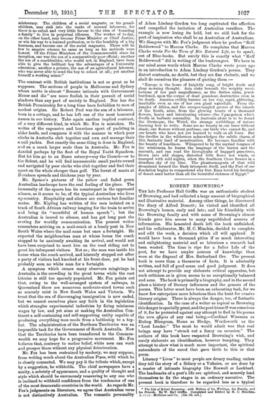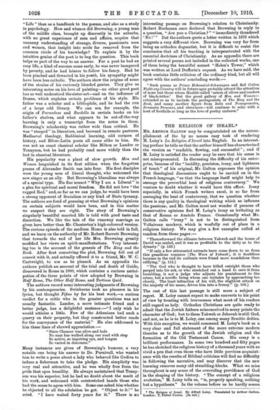ROBERT BROWNING.*
THE late Professor Hall Griffin was an enthusiastic student of Browning, and had collected a large amount of biographical and illustrative material. Among other things, he discovered the diary of Alfred Domett; he visited and identified all Browning's homes, early and late; and his friendship with the Browning family and with some of Browning's closest friends gave him access to many unpublished sources of information. His lamented death left the book unfinished, and his collaborator, Mr. H. C. Minchin, decided to complete and edit the work, a decision which all will applaud. It would have been a thousand pities if so much interesting and enlightening material and so laborious a research had been wasted. The time is ripe for a fuller Life of the poet, for we have ampler sources of knowledge than were at the disposal of Mrs. Sutherland Orr. The present book is more than a thesaurus of facts. It is admirably written, and full of good sense and good judgment. It does not attempt to provide any elaborate critical apparatus, but such criticism as is given seems to us exceptionally balanced and sane. The book is primarily a biography, and in the second place a history of literary influences and the genesis of the poems. This latter must have been an exhausting task, for we know few enterprises more laborious than the hunt for evasive literary origins. There is always the danger, too, of fantastic identification. In the case of a writer so topical as Browning this danger is specially great, and the poet himself was conscious of it, for he protested against any attempt to find in his poems the vera effigies of any real being,—Cardinal Wiseman as Bishop Blougram, Home as Sludge, Wordsworth as the "Lost Leader." The most he would admit was that real beings may have "struck out a fancy on occasion." The authors of this book have respected Browning's wish, and rarely elaborate an identification, however tempting. They attempt to show what is much more important, the spiritual antecedents of the mood that gave birth to this or that poem.
Literary " Lives" to most people are dreary reading, unless they tell the story of a Sidney or a Voltaire, or are done by a master of intimate biography like Boswell or Lockhart. The landmarks of a poet's life are spiritual, and scarcely lend themselves to fix the stages in an ordinary narrative. The present book is therefore to be regarded less as a typical
• The Life of Robert Browning : icith Notices of Ms Writings, his Family, and his Friest&. By W. Hall Griffin. Completed and Edited by H. C. Machin., 1.1 w : Methuen and Co. [12e. 6d. net.]
" Life " than as a handbook to the poems, and also as a study in psychology. How and whence did Browning, a young man of the middle class, brought up discreetly in the suburbs, with no great experience of men and affairs, acquire that uncanny understanding of strange, diverse, passionate men and women, that insight into souls far removed from the common circle of his knowledge ? To explain it by the intuitive genius of the poet is to beg the question. This book helps us part of the way to an answer. For a poet he had an easy life, a kind of success came early, he was never hampered by poverty, and he had leisure to follow his fancy. Had he been pinched and thwarted in his youth, his sympathy might have been less catholic. The authors show the origins of some of the strains of his curiously blended genius. They give us interesting notes on his love of painting—no other great poet has so well understood the sister-art—and on the influence of Donne, which explains certain problems of his style. His father was a scholar and a bibliophile, and he had the run of a large odd library. We can see, for example, the origin of Paracelsus and Sordello in certain books on his father's shelves, and what appears to be out-of-the-way learning is only a transcript from the notes in them. Browning's scholarship was rather wide than critical. He
was " steeped" in literature, and browsed in remote pastures. Mediaeval theology, Rabbinical learning, odd corners of history, and Silver-Latin poets all came alike to him. He was not an exact classical scholar like Milton or Landor or Tennyson, but he had probably read more widely than the
last in classical literature.
His popularity was a plant of slow growth. Men and Women languished in its first edition when the forgotten poems of Alexander Smith ran into four. His first disciples were the young men of liberal thought, who welcomed the
new singer as an ally. But Browning's liberalism was always of a special type. His fine -sonnet " Why I am a Liberal " is a plea for spiritual and moral freedom. He did not love "the ragged Red," and, so far as we can judge, he would have been a strong opponent of Socialism or any kind of State tyranny. The authors are fond of guessing at what Browning's opinions on certain subjects would have been, and in this matter we suspect they are right. The story of Browning's singularly beautiful married life is told with good taste and discretion. We like the tale of the runaway marriage as given here better than Mr. Cheaterton's high-coloured version. The curious episode of the medium Home is also told in full, and we learn on the authority of Mr. Robert Barrett Browning
that towards the end of her life Mrs. Browning greatly modified her views on spirit-manifestations. Very interest- ing too is the account of the genesis of The Ring and the Book. After first conceiving the plot, Browning fell out of conceit with it, and actually offered it to a friend, Mr. W. C.
Cartwright, to use as be pleased. As an appendix the authors publish an account of the trial and death of Guido, discovered in Rome in 1900, which contains a curious antici- pation of the three points of view adopted by Browning in Half Rome, The Other Half Rome, and Tertium Quid.
The authors record some interesting judgments of Browning by his contemporaries. Swinburne took no pleasure in his lyrics, but thought Fifine by far his best work,—a curious verdict for a critic who in the greater questions was not usually fantastic. Landor, a more intimate friend and a better judge, has a delightful sentence :—" I only wish he would atticize a little. Few of the Athenians had such a quarry on their property, but they constructed better roads for the conveyance of the material." He also addressed to him these lines of shrewd appreciation :—
"Since Chaucer was alive and hale
No man has walked along our road with step So active, so inquiring eye, and tongue So varied in discourse."
Many instances are given of Browning's humour, a very notable one being his answer to Dr. Furnivall, who wanted
him to write a poem about a lady who behaved like Godiva to induce a fisherman to take the pledge. His simplicity was very real and attractive, and he was wholly free from the pride that apes humility. He always maintained that Tenny- son was his superior, but he had no doubt about the merit of his work, and welcomed with outstretched bands those who had the sense to agree with him. Some one asked him whether he objected to all the adulation he got. " Object to it!" he cried. " I have waited forty years for it." There is an interesting passage on Browning's relation to Christianity.
Robert Buchanan once declared that Browning in reply to a question, " Are you a Christian ? " " immediately thundered ' No ! '" But the authors quote a letter written in 1876 which suggests a very different view. Browning was very far from being an orthodox dogmatist, but it is difficult to resist the conclusion that all his teaching is interpenetrated with the essential doctrines of Christianity. As an appendix there are printed several poems not included in the collected works, one of them being the beautiful sonnet "Helen's Tower," which was written at Lord Dufferin's request. As we have said, the book contains little criticism of the ordinary kind, but all will agree with the authors' concluding words :—
" Such poems as Prince Hohenstiel-Schwangau and Red Cotton Night-cap Country will in future ages probably attract the attention of none but those whom Hazlitt called `eaters of olives and readers of black-letter.' But the great gallery of Men and Women— extended so as to include the protagonists of The Ring and the Book, and many another figure from Bells and Pomegranates, Dramatis Personae, and elsewhere—will continue to echo with a host of footfalls so long as the love of poetry endures."



























































 Previous page
Previous page